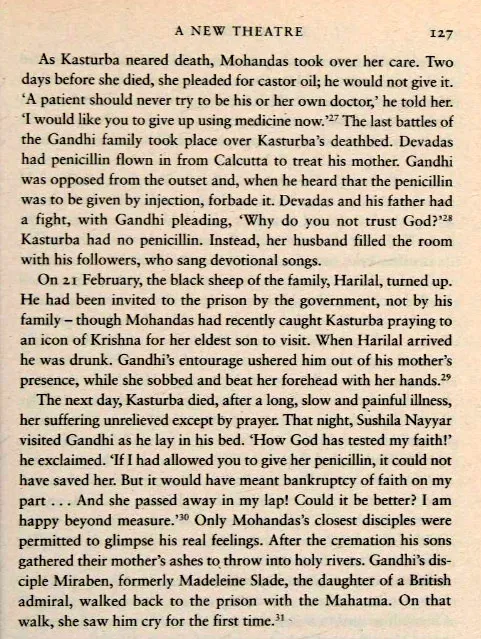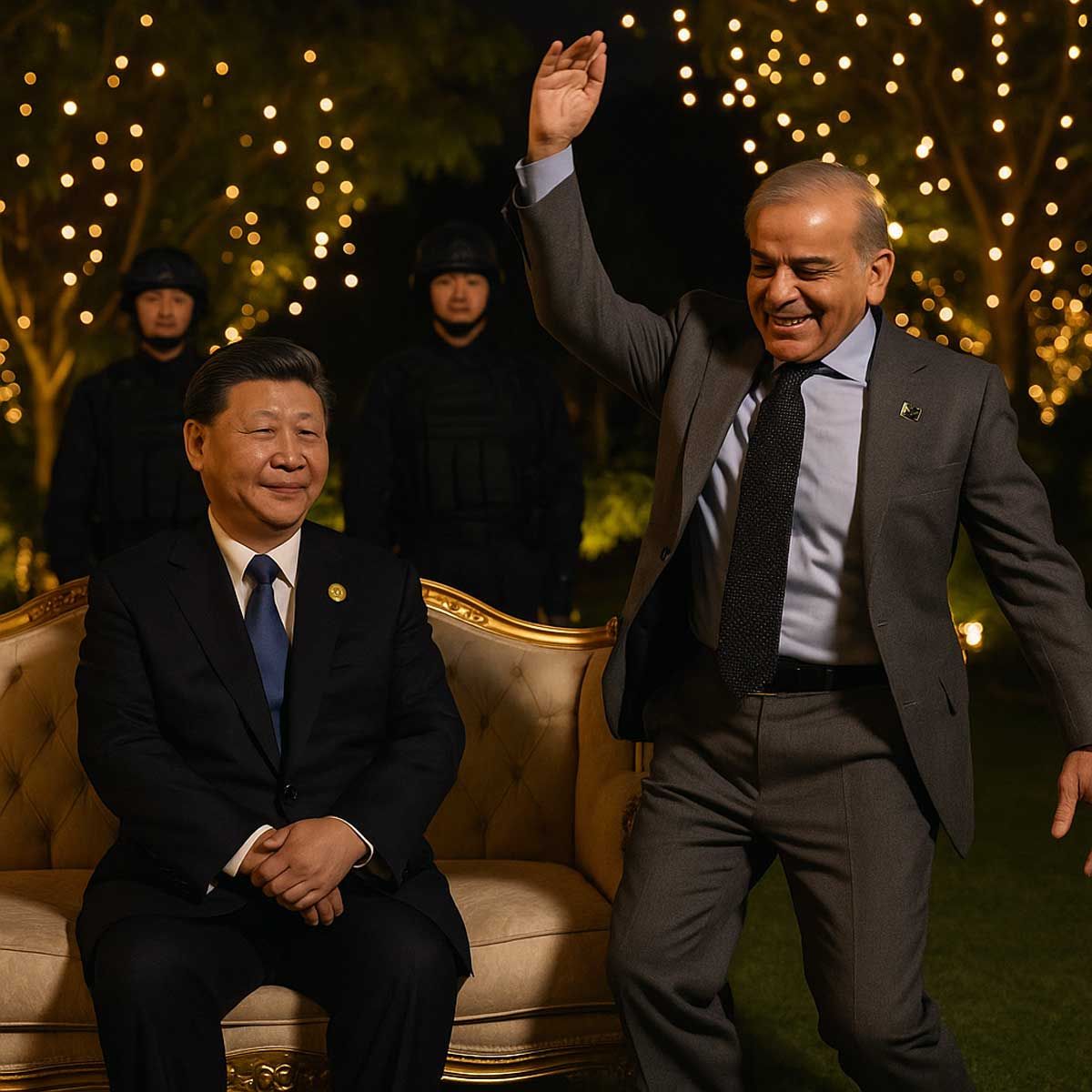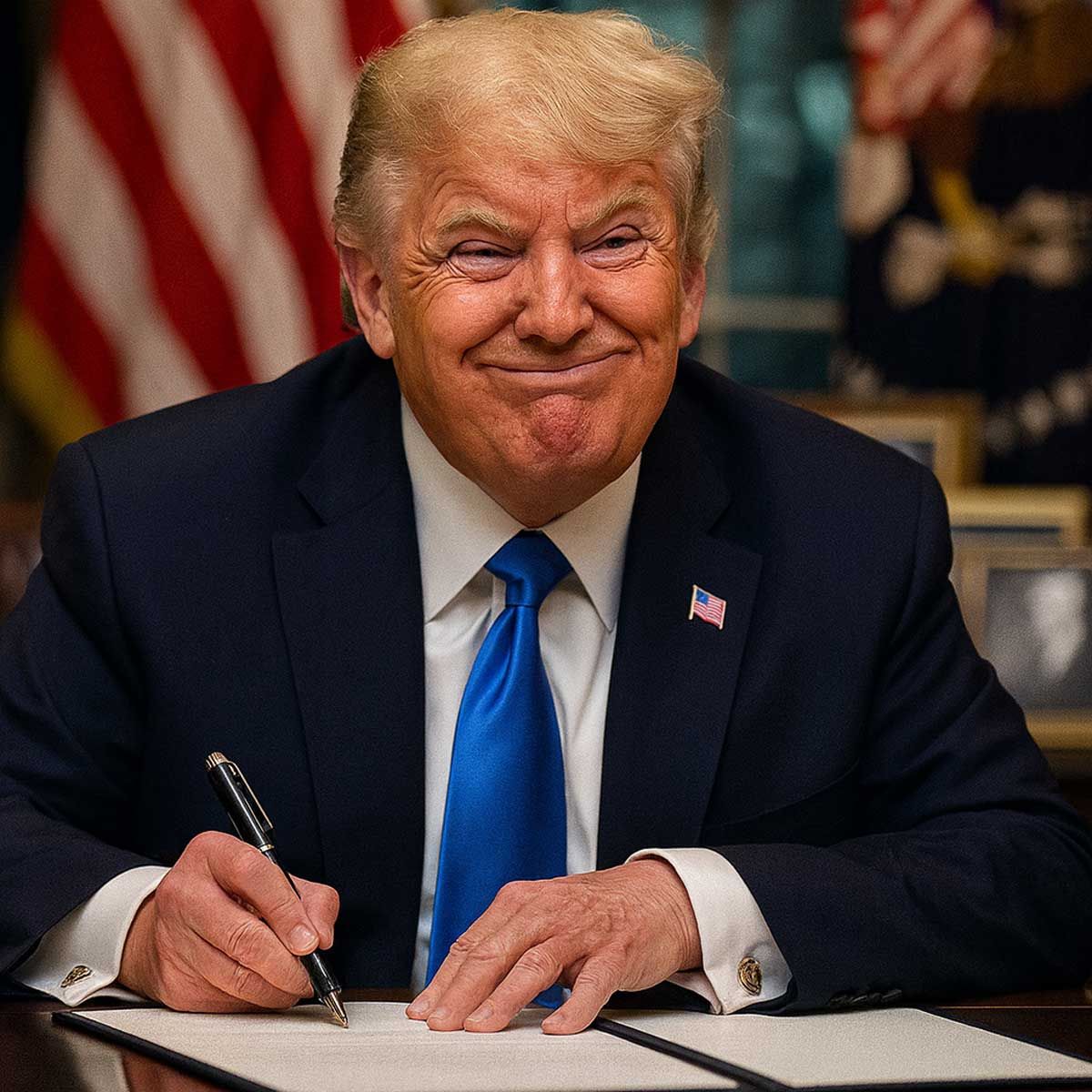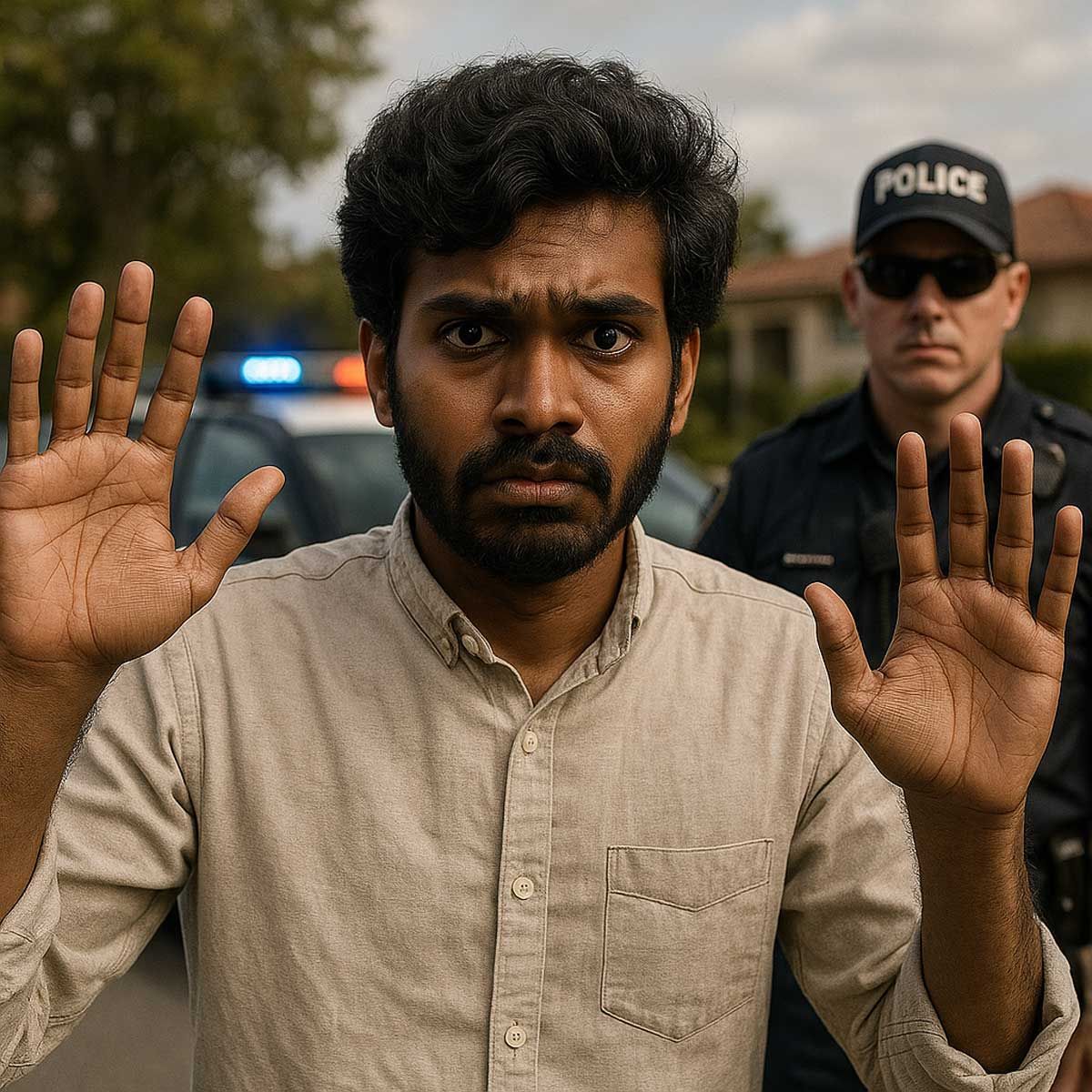Sanatan Articles
Satyaagrah
Written on
Satyaagrah
Written on
Satyaagrah
Written on
Satyaagrah
Written on
Satyaagrah
Written on
JOIN SATYAAGRAH SOCIAL MEDIA
"Words are the mask, actions the revealing face": For Kasturba, Gandhi prescribed faith over penicillin, Yet, when it came to Manu or self, modern surgeries weren't off the table. Ah, the enigmatic dance of traditional vs. modern in Gandhi's world!

Mahatma Gandhi, an iconic figure in India's freedom struggle, once refrained from allowing 'modern medicine' for his ailing wife, Kasturba. However, when it came to another family member, Manu, his views were seemingly different. This revelation poses a pertinent question: Why was there a difference in his approach?
Manu, a close family member, was Mahatma Gandhi's grandniece. It's intriguing to note that she played a role in some of Gandhi's more controversial practices. These so-called 'experiments with celibacy' saw Gandhi sleeping unclothed alongside young women, with some even assisting him during bath times. Manu and Abha, another grandniece, were frequently observed alongside Gandhi, offering him physical support during his walks, indicating the depth of their bond.
The 21st of February 1944 marked a somber day in the Gandhi household. On this day, a fierce disagreement arose between Gandhi and his son, Devadas. Kasturba Gandhi, Mahatma's beloved wife, was critically ill with pneumonia. In a desperate bid to save her, Devadas wanted to administer penicillin – a revolutionary drug at the time. This account is well documented in Alex Von Tunzelmann's book, 'Indian Summer: The Secret History of the End of an Empire', specifically in the chapter titled ‘A New Theater’.
But Gandhi, with his profound faith and traditionalist views, strongly resisted the idea of using the drug. He believed in spiritual healing and even persuaded Kasturba to renounce medicine as her life was hanging by a thread. In a heartfelt and stirring moment, Devadas arranged for penicillin to be transported from Calcutta (present-day Kolkata). But Gandhi vehemently opposed it, questioning Devadas's faith by asking, "Why do you not trust God?"
 |
| Excerpt from Indian Summer: The Secret History of the End of an Empire. Source: Archive.org |
In lieu of medical treatment, Gandhi chose a spiritual path. He surrounded the ailing Kasturba with followers who serenaded her with soul-stirring devotional songs. The atmosphere was heavy with emotion. Regrettably, on the very next day, 22nd February 1944, Kasturba Gandhi took her last breath. Expressing his feelings to Sushila Nayyar, a close confidante, and physician, and another participant in his “celibacy experiments”, Gandhi reflected on Kasturba's passing and remarked, “’How God has tested my faith! ‘If I had allowed you to give her penicillin, it could not have saved her. But it would have meant bankruptcy of faith on my part… And she passed away in my lap! Could it be better? I am elated beyond words."
Details of this emotional chapter of Gandhi's life can also be found in Siby K Joseph’s book titled ‘Kasturba Gandhi – An Embodiment of Empowerment‘. The 22nd chapter, 'The Road to Martyrdom', delves deep into the situation, with firsthand accounts from Nayyar. In her notes, Nayyar mentioned a poignant conversation wherein Gandhi instructed her to cease all medicinal treatments for Kasturba. He even expressed his reluctance in administering modern medicines to his children during grave illnesses. In this emotionally charged environment, Gandhi's desire for Kasturba to be nourished only with water and honey is detailed, along with the intense debates between Devadas and his father.
However, a perplexing aspect remains: Gandhi's staunch stance against modern medicine for Kasturba and his children seemed to waver when it came to his own well-being. Documents reveal that he availed himself of contemporary medical treatments, including surgeries, during various phases of his life, even though Kasturba was denied the life-saving penicillin.
 |
| Author | Alex Von Tunzelmann - Indian Summer: The Secret History of the End of an Empire |
In recent years, India's medical history saw an intriguing revelation. The Indian Council of Medical Research (ICMR) brought to light an engaging episode of Mahatma Gandhi's life in their 2019 publication, "Gandhi and Health." The book, which marked Gandhi's 150th birth anniversary, contained a chapter, “Gandhi’s Experiments With Health,” penned by Annalalai of the National Gandhi Museum. This chapter provided insights into Gandhi's medical journey, particularly focusing on an emergency surgery he underwent.
The detailed account began with the events leading to 12th January 1924. On this day, Gandhi, who was serving a sentence in Pune for sedition since 1922, faced a medical emergency. The atmosphere was tense; Pune, nestled in the Sahyadri mountains, witnessed a raging thunderstorm. Against this tumultuous backdrop, Mahatma Gandhi was admitted to Sassoon Hospital, requiring an immediate appendectomy.
|
The chapter unfolded a cinematic sequence of events. The surgeon assigned for this high-profile patient was none other than a British colonel, Maddock. In a twist that could have been straight out of a thriller, the operating room's electric bulb flickered and died amidst the procedure. The medical team, unflinching and resilient, completed the surgery by the dim light of a hurricane lamp. Despite the gravity of his situation and the procedure's perils, Gandhi's ever-present spirit of gratitude shone bright. Both he and Kasturba extended heartfelt thanks to the entire medical team, capturing the moment with a cherished photograph. Later, during Gandhi's 1931 visit to London, he fondly reconnected with Col. Maddock, showcasing the bond that had been forged in that intense night.
|
|
In addition to this publication, media sources have spotlighted this episode. An India Today report emphasized Gandhi's initial wish to have Dr. Dalal and Dr. Jeevraj from Mumbai attend to him. However, the immediacy of the situation led the British surgeon, Dr. Colonel Maddock, to step in, emphasizing the critical need for the operation. Today, Pune's Sassoon Hospital stands not just as a medical institution but as a memorial, etching this moment in history.
Yet, a different facet of Gandhi's relationship with modern medicine emerged when discussing the health of Manu Gandhi. Prakhar Shrivastava, Senior Consulting Editor of DD News, responded to journalist Rahul Dev's claim about Gandhi's unwavering faith in traditional treatments. Shrivastava highlighted the apparent contrast in Gandhi's decision-making. While he had earlier been against the use of contemporary medicine for Kasturba, he made an exception for Manuben. In a move showcasing deep involvement, Gandhi was present in the operating theater, observing Manuben's appendix surgery with keen interest.
Dev's stance was that Gandhi's choices regarding his family's health stemmed not from malicious intent but from deep-rooted faith. Gandhi, according to Dev, believed ardently in traditional treatments and prayers, holding them in higher regard than modern medicinal practices. The interplay of beliefs and decisions, faith, and medicine in Gandhi's life paints a complex and intriguing portrait of the man.
The year 1947, particularly the month of May, held a significant episode in the life of Mahatma Gandhi and his close family. Just three years after the demise of Kasturba Gandhi, another critical medical emergency surfaced. The ICMR’s book offered a meticulous account of the events that transpired on the 15th of May.
|
Diving into the details, the narrative outlined Gandhi's meticulous observance and detailed recollection of Manu's health. On that day, as per Gandhi's diary, Manu's condition began with intense stomach pains, accompanied by episodes of vomiting and a rising temperature. The situation's gravity was soon apparent, and medical consultations confirmed that Manu had appendicitis. With a sense of urgency, Gandhi ensured her immediate hospitalization, with the surgery scheduled for that very night.
The narrative further shed light on the personal side of this medical incident. Concerned family members, including Madalasa and Santok, were present to support Manu during this challenging time. While others like Mridula and Madu stayed by her side, they were restricted from entering the operation theatre. In a rare move, Gandhi donned a surgical mask to personally observe the entire procedure, displaying his deep attachment and concern. Dr. Col. Bhargava was the lead surgeon who operated on Manu.
Interestingly, before turning to the modern surgical procedure, Gandhi, always an ardent believer in traditional treatments, attempted to alleviate Manu's pain using a mud-pack treatment. This treatment, as revealed by a letter written by Gandhi to Jaisukhlal Gandhi (Manu's father), was hoped to cure the appendicitis. However, when this method didn't yield the expected results, Gandhi wisely conceded to the medical opinion and ensured Manu underwent the necessary surgery.
|
Delving deeper into Manu's relationship with Gandhi, the narrative revisits their intricate bond. Manu was not just a distant relative; she played a significant role in some of the more controversial aspects of Gandhi's life, notably his 'experiments with celibacy.' She, along with another grandniece, Abha, often accompanied Gandhi, providing him with physical support.
Manuben's diaries, which were accessed by India Today in 2013, provided further insights into their relationship. The diary entries portrayed an image of Gandhi as a central figure in her life. From decisions about her diet and education to her daily routines and even her attire, Gandhi's influence was all-pervading. There were even mentions of her sharing the same bed with Gandhi.
The period photographs, available for public viewing, further corroborate this narrative. The images capture the rare moment of Gandhi, deeply engrossed, witnessing a medical operation – a testament to the profound connection he shared with Manu.
In conclusion, the detailed chronicles of Gandhi's interactions with modern medicine provide a fascinating lens to understand the complexities of his beliefs and choices. While he sometimes opted for traditional treatments, there were occasions where he recognized and embraced the advancements of modern medicine. This multifaceted approach to healthcare paints a nuanced image of Gandhi, underlining his humaneness, his dilemmas, and the depth of his connections.
 Support Us
Support Us
Satyagraha was born from the heart of our land, with an undying aim to unveil the true essence of Bharat. It seeks to illuminate the hidden tales of our valiant freedom fighters and the rich chronicles that haven't yet sung their complete melody in the mainstream.
While platforms like NDTV and 'The Wire' effortlessly garner funds under the banner of safeguarding democracy, we at Satyagraha walk a different path. Our strength and resonance come from you. In this journey to weave a stronger Bharat, every little contribution amplifies our voice. Let's come together, contribute as you can, and champion the true spirit of our nation.
 |  |  |
| ICICI Bank of Satyaagrah | Razorpay Bank of Satyaagrah | PayPal Bank of Satyaagrah - For International Payments |
If all above doesn't work, then try the LINK below:
Please share the article on other platforms
DISCLAIMER: The author is solely responsible for the views expressed in this article. The author carries the responsibility for citing and/or licensing of images utilized within the text. The website also frequently uses non-commercial images for representational purposes only in line with the article. We are not responsible for the authenticity of such images. If some images have a copyright issue, we request the person/entity to contact us at This email address is being protected from spambots. You need JavaScript enabled to view it. and we will take the necessary actions to resolve the issue.
Related Articles
- Indian state bans book on Mahatama Gandhi after reviews hint at his gay relationship
- Father of the Nation! Absolutely not. Mohandas Karamchand Gandhi was not the father of the nation either officially or otherwise
- When Secular Nehru Opposed Restoration Of Somnath Temple - The Somnath Temple treachery
- Martyrs’ march into the history - Rajguru: The Invincible Revolutionary
- Bhagat Irwin Gandhi - Martyrdom of Shaheed Bhagat Singh (Some Hidden Facts)
- Moplah Genocide of the Malabar Hindus, 1921: Thousands of Hindus slaughtered
- Netaji, an Impossible man can never be boxed into an ideological corner: Not just the most enigmatic figure in world history but his life is also a tough lesson in how to think about history
- The perpetrator of the Jallianwala Bagh massacre General Reginald Dyer was forgiven by Mohandas Gandhi as an exercise of forgiveness or love to nurse Dyer back to life if he was suffering from a physical malady
- A Great man Beyond Criticism - Martyrdom of Shaheed Bhagat Singh (Some Hidden Facts)
- Godse's speech and analysis of fanaticism of Gandhi: Hindus should never be angry against Muslims
- Nehru's Himalayan Blunders which costed India dearly - Integration of Princely States
- During Partition Hindu and Sikh refugees concentrated in Delhi to a humiliating and dehumanizing experience whereas Muslim were being provided with rations, funds, jobs and shelter: MK Pahwa try to assassinate Gandhi
- Anuj Dhar claims that Subhas Chandra Bose was suspected of being ‘poisoned’ after ouster from the post of Congress president
- If not for Muslim appeasement, Vande Mataram would have been India's National Anthem: the history of Muslim opposition and support
- Vinayak Damodar Savarkar – A Misunderstood Legacy





















